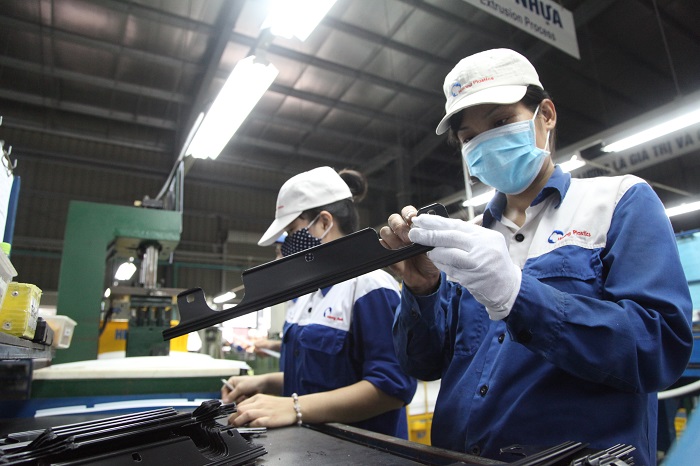Strong private sector key to Vietnam economic transformation: Report
A private sector-led low-carbon economic growth model can enable Vietnam’s goal of becoming a high-income country by 2045.
As Vietnam fights another wave of Covid-19, accelerating the pace of reforms, upgrading workforce skills and infrastructure will strengthen the private sector to help the country recover from the pandemic and unlock its potential, according to a new World Bank Group report.
| A manufacturing facility in Hanoi. Photo: Nguyen Viet |
The Vietnam Country Private Sector Diagnostic (CPSD) report, by IFC and the World Bank, says while the private sector has played a frontline role in Vietnam’s outstanding development in recent years, it’s now time to fully exploit the potential of the private sector to boost productivity growth so Vietnam can achieve its goal of becoming a high-income country by 2045.
“The private sector has helped propel Vietnam to join the ranks of middle-income economies in just one generation, and the country was preparing for its next economic transformation when the Covid-19 hit,” said Kim-See Lim, IFC Regional Director for East Asia and the Pacific. “With another wave, it’s all the more imperative for Vietnam to help develop a dynamic, diversified and innovative private sector for the post-Covid 19 recovery phase, as public resources become scarce.”
The report finds a shift toward efficient, productive, and green private investment is essential to sustain Vietnam’s rapid and sustainable economic development. This will require bolstering the private sector by reducing constraints on entry and competition, upgrading global value chains, diversifying into knowledge-intensive sectors, addressing skills gaps, and increasing digitalization across sectors.
“The country’s emerging and dynamic private sector has demonstrated resilience during the Covid-19 pandemic and has contributed in making Vietnam one of few countries attaining positive economic growth in 2020,” said Carolyn Turk, World Bank Country Director for Vietnam. “Continued bold reforms are needed to create a more robust basis for competition and innovation in the economy, through which a private sector-led low-carbon economic growth model can enable Vietnam’s goal of becoming a high-income country by 2045.”
The report says key areas for the reform agenda include leveling the playing field to ensure sound competition among all businesses, expanding access to finance for small and medium enterprises, improving availability of long-term capital, strengthening and greening infrastructure services, and ensuring a skilled labor force for a productive, innovative and high-value growth model.
“Sustaining and building on Vietnam’s development success story requires further reforms aimed at empowering the private sector to grow and drive the economy into a sophisticated, innovative, and sustainable growth trajectory,” said Kyle Kelhofer, IFC Country Manager for Vietnam, Cambodia, and Lao PDR. “The Covid-19 pandemic has reinforced the urgency to address private sector development challenges to seek public-private solutions to best leverage and incentivize the private sector. This is especially important as the government’s resources, already constrained, have been prioritized for health care and livelihood support.”
While power, logistics, education and skills training, agribusiness, and tourism are some of the sectors with strong potential for private sector participation, the report says regulatory constraints remain significant. Demand for sustainable electricity and logistics services has been on the rise, driven by further industrialization, a growing middle-income population, and urbanization. Private investment in these sectors could help ease the burden on the state budget and contribute to the greening of infrastructure and production through new investments in renewable energy and climate-smart solutions.
As Vietnam aims to move up the global value chain by growing knowledge-intensive exports, services, and higher value-added industries, the demand for skilled labor and sophisticated technologies will increase, requiring an overall strategy to address the skills gap and shortage in the country. Moreover, as agribusiness and tourism continue to be key contributors to economic growth and job creation, improvements in productivity, operating costs, quality and safety, and sustainability will help boost further expansion across sectors.
The findings of the report will be used to craft IFC’s strategic inputs for the World Bank Group’s new Country Partnership Framework with the government of Vietnam, paving the way for joint programming to create markets and unlock private sector potential.












